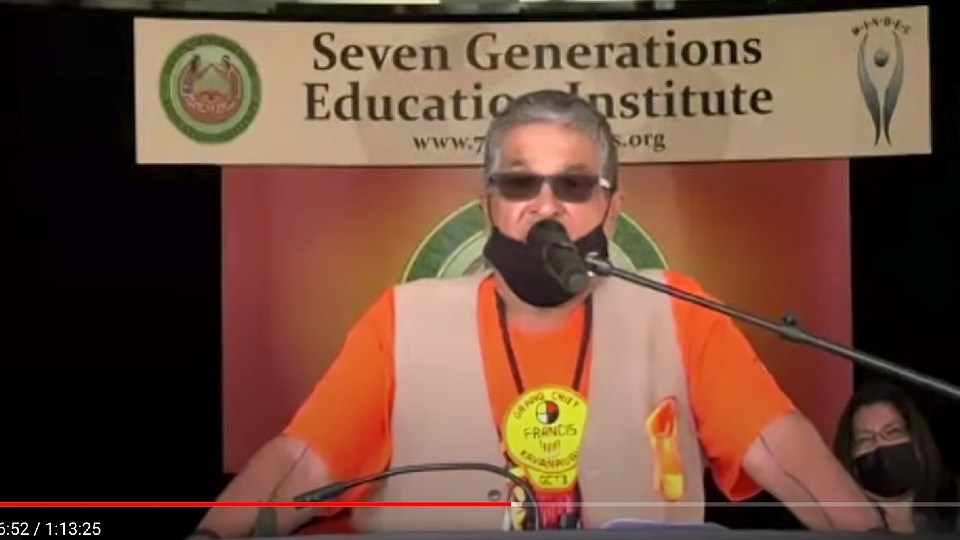Premier Doug Ford held a press conference June 15 announcing $10 million over three years to help "identify, investigate, protect and commemorate" residential school burial sites.
The move comes in the wake of the recovery of the remains of 215 children on the site of a former residential school in Kamloops, B.C. Since that discovery, Indigenous leaders across the country are calling for all residential schools sites to be thoroughly investigated.
What is of the utmost importance to many communities, as well as at least one provincial MPP, Sol Mamakwa of the Kiiwetinoong riding, is that the investigations are Indigenous-led.
Ford’s announcement was held at the Manidoo Baawaatig (Kenora) campus of the Seven Generations Education Institute and attended by the premier, Indigenous Affairs Minister Greg Rickford and several Indigenous leaders from across the province, including Ogichidaa Francis Kavanaugh, grand chief of the First Nations in Treaty 3 territory in northwestern Ontario and Manitoba, who spoke at the event.
“This is a moment to recognize the painful legacy of Canada’s residential school system and the damaging, lasting effects it has had on survivors and Indigenous communities,” said Kavanaugh. “We know the news from Kamloops has deeply impacted survivors and their families and that Indigenous communities are hurting, including here in Ontario. We’re here to support them.”
Kavanaugh also reiterated the need to ensure that the investigations are done “in a good way,” based on his conversations with elders and knowledge keepers.
“It is important that our efforts are done in a proper way, to respect the spirits of the children.”
Rickford said initial site identification will be the first step in what is anticipated to be a “much more extensive project.”
It is for this reason the government also announced that not only will they be working in partnership with survivors, elders, leaders and communities, but that, “the Government of Ontario will ensure that technical experts, such as archaeologists, forensic specialists and historians are available to support communities.”
This includes Dr. Michael Pollanen, Ontario’s chief forensic pathologist and Dr. Dirk Huyer, Ontario’s chief coroner.
The timeline, said Rickford, will be set by the communities.
“We anticipate that many will want this process to move as quickly as possible. However, we must also ensure that the process is respectful and thorough. To that end, we are offering communities additional pieces of support.”
Rickford said the addition of the two top doctors ensures “this critical work is done to the highest standard possible and rooted in a respectful and informed approach by the Indigenous people of Ontario.”
In his opening remarks, Ford spoke to this announcement as a response to the lack of action from the federal government.
“While we're prepared to work with the federal government,” said Ford, “we simply cannot wait any longer to act, support survivors, their families and Indigenous communities.”
When questioned, he did not provide specifics, but furthered his commitment to the Indigenous-led action.
One member of the media present asked if the Catholic Church was to be involved in the reconciliation process.
Rickford said he believes the church should "become an integral part of this process to the extent of their involvement."
Kavanaugh said the church should take it a step further.
"I believe that the Catholic Church needs to come forward and make efforts to bring the Pope to Canada for a formal apology to all First Nations across Canada," he said.
Kavanaugh also asked that any Canadians surprised by the remains found at the Kamloops Residential School use this as an opportunity to educate themselves on what he called, “crimes against humanity.”
“As a society, we can no longer hide behind the past or deny the reality of what happened in Canada,” said Kavanaugh. “We must admit the crimes of the past and actively work towards ensuring that this is no longer true for the survivors, the children, (or) our families.”
He also offered words to his people. “I want to offer my support,” said Kavanaugh. “If you are ready to, please reach out to someone to talk to. We cannot suffer in silence any longer.”
